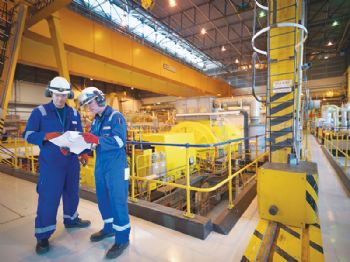
Government officials have said that companies bidding to establish new nuclear power stations in the UK have been told they must offer a price for their electricity considerably lower than that approved for the Hinkley Point C plant last year, raising questions about the viability of the UK’s plans for a new generation of reactors.
Future projects will be expected to deliver a discount of at least 15-20% on the Hinkley Point price.
A Government spokesman said that lower prices are “crucial to maintaining political support for new nuclear plants”.
Hinkley Point C — approved last September and due to open in 2025 — will become the UK’s first new nuclear power station since the opening of Sizewell B in Suffolk in 1995. Five more plants are at varying stages of development, with Moorside and Wylfa the most advanced.
However, industry analysts say that the prospect of less lucrative contracts will add to the financing difficulties facing reactor developers and intensify their demands for Government financial aid to meet the multi-billion-pound construction costs.
Uncertainty surrounding the UK’s nuclear new-build programme — one of the biggest in the developed world — was highlighted last month when Toshiba said it was looking to sell its controlling stake in the NuGen Consortium, which is planning to construct three reactors at Moorside in Cumbria.
The announcement, which left NuGen in need of new investors to survive, followed a $6.3 billion write-down of Toshiba’s nuclear business in the USA. NuGen is one of two Japanese-led developers that will begin negotiations with the Government in the coming months over a “strike price” for electricity from new UK nuclear plants.
The other is Horizon (owned by Hitachi), which is planning to build two reactors at Wylfa in Anglesey, Wales.
Strike prices represent a premium over the wholesale cost of electricity, guaranteed to power plant developers as an incentive for urgently needed new capacity.
An industry analyst said: “One of the biggest factors pushing up the strike price is the cost of capital. If the Government wants a low strike price, it is pretty clear that it has to think about a different kind of financing solution.”
He added that there are signs the Government wants to pit NuGen and Horizon against each other in a competitive process, with no guarantee that both would go ahead. He said this would be a mistake: “Developers have already spent billions preparing their sites and clearing planning and regulatory hurdles.
“If developers are told that you have to spend all that money just to enter a competition, that would have a profoundly negative impact of perceptions of the UK nuclear market.
“The strike price has to come from the bottom up, reflecting the costs of the supply chain, technology and site development, rather than something imposed from the top down. We’re at a crossroads moment, and the Government has to make a decision soon.”